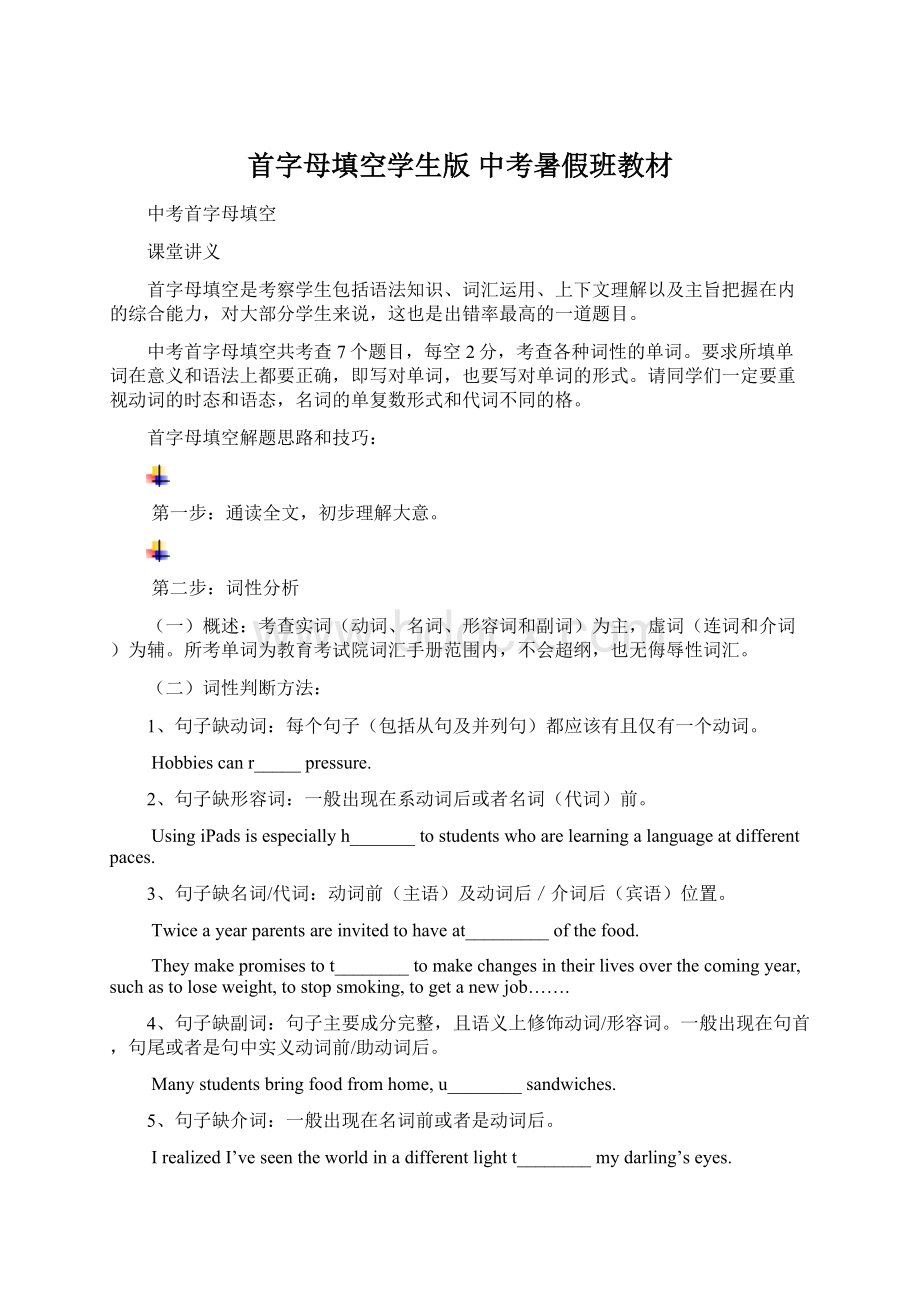首字母填空学生版 中考暑假班教材.docx
《首字母填空学生版 中考暑假班教材.docx》由会员分享,可在线阅读,更多相关《首字母填空学生版 中考暑假班教材.docx(38页珍藏版)》请在冰豆网上搜索。

首字母填空学生版中考暑假班教材
中考首字母填空
课堂讲义
首字母填空是考察学生包括语法知识、词汇运用、上下文理解以及主旨把握在内的综合能力,对大部分学生来说,这也是出错率最高的一道题目。
中考首字母填空共考查7个题目,每空2分,考查各种词性的单词。
要求所填单词在意义和语法上都要正确,即写对单词,也要写对单词的形式。
请同学们一定要重视动词的时态和语态,名词的单复数形式和代词不同的格。
首字母填空解题思路和技巧:
第一步:
通读全文,初步理解大意。
第二步:
词性分析
(一)概述:
考查实词(动词、名词、形容词和副词)为主,虚词(连词和介词)为辅。
所考单词为教育考试院词汇手册范围内,不会超纲,也无侮辱性词汇。
(二)词性判断方法:
1、句子缺动词:
每个句子(包括从句及并列句)都应该有且仅有一个动词。
Hobbiescanr_____pressure.
2、句子缺形容词:
一般出现在系动词后或者名词(代词)前。
UsingiPadsisespeciallyh_______tostudentswhoarelearningalanguageatdifferentpaces.
3、句子缺名词/代词:
动词前(主语)及动词后/介词后(宾语)位置。
Twiceayearparentsareinvitedtohaveat_________ofthefood.
Theymakepromisestot________tomakechangesintheirlivesoverthecomingyear,suchastoloseweight,tostopsmoking,togetanewjob…….
4、句子缺副词:
句子主要成分完整,且语义上修饰动词/形容词。
一般出现在句首,句尾或者是句中实义动词前/助动词后。
Manystudentsbringfoodfromhome,u________sandwiches.
5、句子缺介词:
一般出现在名词前或者是动词后。
IrealizedI’veseentheworldinadifferentlightt________mydarling’seyes.
6、句子缺连词:
句子中出现了两个谓语动词。
Peoplecandownloada1GBmoviewithin6minutesinSouthKorea,b_____inChinaitwouldtakehalfanhour.
练习时间:
判断下面空格缺单词的词性。
Itwas3:
21a.m.whenten-year-oldGlennCreamerwaswokenupbythesmellofburning.Exceptforthecracking(爆裂声)offlamessomewherebelow,therewasnotasoundinthetwo-floorhouse.Buthe1.________atoncewhatwashappening.
2.______hisfatherwasawayonnightdutyatalocalfactory,Glennwasworriedaboutthesafetyofhisother,his14-year-oldsisterKarenandhis12-year-oldbrotherTodd.Herandownstairsthroughthesmoke-filledhousetopushandpullatKarenandTodduntiltheysatup.Thenhehelpedthem3._______thesafetyofthegarden.There,hissisterandbrother,takingshortandquickbreathsandcoughing,couldn’tmoveanymore.
Theten-year-oldracedbackintothehouseandupstairsintohismother’sroom.Hefoundit4._________towakeherupandtherewasnobodytohelpGlenncarryhertothegarden.Buttheboykeptcalm.Asafiremansaidlater,“Heactedwithalltheself-controlofatrainedadult.”
Onthebedroomtelephone,luckilystillworking,Glenncalled5._______father.AfterGlennmadesurehisfatherwouldtelephonethefiremenandambulanceservice,hegotonwiththetask6.______savinghismother.
Firsthefilled7.______bucketwithwaterfromthebathroomandthrewwateroverhismotherandherbed.Inthisway,shewouldbekeptawayfromthefirebeforethefiremenarrived.Then,withawetclotharoundhisheadhewentbacktothegarden.
Hecouldhearthefireenginecomingup,buthowwouldthefiremenfindhismother8.______thesmoke-filledhousewherefirehadalmostcoveredthegroundfloor?
Fetchingaballofstring(绳)fromthegarage,Glennracedbackintothehouse9._______rushedupstairstohismother’sroom.Hetiedoneendofthestringtoherhand.Thenhebegantorunback.Helaidoutthestringashewentthroughthehallandbackoutintothegarden.
MinuteslaterhewastellingfireChiefJohnCoughlan,“Thestringwilllead10.________tomother/canhelpyoufindmother.”Mrs.Creamerwascarriedtosafetyastheflameswerebreakingthroughherbedroomfloor.
第三步:
词意判断
(一)概述:
根据上下文逻辑(包括句内逻辑、句间逻辑以及篇章逻辑)、重点词汇来判断词意。
常见逻辑关系词---句间逻辑:
类型
常考逻辑关系词
对立关系
让步:
although,though,eventhough,evenif,despite,inspiteof
“虽然,尽管,即使,即便,不管”
转折:
but,however,yet,while,insteadof,not…..but“然而,但是”
并列递进
并列:
and,andalso,or,similarly,aswellas,neither……nor,either……or,notonly……butalso,thesame……as;ononehand……ontheotherhand,foronething……foranother,one……another,some……others……stillothers“和/或/也,一方面……另一方面”
递进:
also,then,besides,inaddition,furthermore,moreover,what’smore
“还,甚至,并且,另外”
因果
因为:
because,for,since,as,dueto,thanksto,becauseof,nowthat,forthisreason“因为,由于”
所以:
thus,therefore,so,so…..that,such…..that,asaresult“所以”
条件
if,unless,aslongas“如果,除非,只要,要是”
举例
suchas,forexample,forinstance,of(these,those,them),among(these,those,them)“例如,比如”
时间
when,whenever,before,after,since,as,while,until/till,assoonas,atthesametime,everytime,bythetime
目的
inorderthat,sothat,soasto,inorderto“为了,以便,以致于”
类型
常考逻辑关系词
对立
让步:
although,though,eventhough,evenif,despite,inspiteof
“虽然,尽管,即使,即便,不管”
转折:
but,however,yet,while,insteadof,not…..but“然而,但是”
并列
递进
并列:
and,andalso,or,similarly,aswellas,neither……nor,either……or,notonly……butalso,thesame……as;ononehand……ontheotherhand,foronething……foranother,one……another,some……others……stillothers“和/或/也,一方面……另一方面”
递进:
also,then,besides,inaddition,furthermore,moreover,what’smore
“还,甚至,并且,另外”
总分
suchas,forexample,forinstance,of(these,those,them),among(these,those,them)“例如,比如”
第四步:
验证语法。
1、名词的形式(复数,所有格)
AndthatdayIthoughtalotaboutmakingsomec_______inmylife,asIlistenedtoherinnocent(天真的)wordsthatcutmelikeaknife.
Butasthenationpaysmoreattentiontoc______health,healthierfoodshavestartedtfindtheirwayontoschoolmenus.
2、动词的形式(时态和语态即三单、过去时、现在分词、过去分词)
Itusuallyf__________witharesponseof“I’mgood,andyou?
”or“I’mwell,andyou?
”
Mydaughterc_______her“conversation”,asIsatdownonthefloor.
3、形容词/副词的形式(原级、比较级、最高级)
IfastudentspendsmoretimewatchingvideosonaniPad,hewillhavef_______opportunitiestohaveface-to-facecommunicationwithothers.
4、代词的形式(格、单复数、反身代词)
Thewindcomingfromthefanwillblowawaytheemptyboxesandleavetheothero_______withsoap.
课堂练习
Passage1★★★★★(17年宝山一模)
Attimesweallgetangrywhenwearedriving.Itmightbebecausewearestuckinatrafficjamorstuckbehindaverys81driver.Itmightbebecausewethinkanotherdriverhasdonesomethingverystupidanddangerous.Whateverthereason,itseemsthatgettingangryinacarissomethingwhichhappensmoreandmoreoftenandthereisnowaspecialtermf82it:
'roadrage'(路怒症).Someexpertseventhinkthatroadrageisakindofmentalillness!
Howcanwerecognizethis'illness'ofroadrage?
Therearetwokindsofroadrage:
aggressive(攻击性的)drivingandaggressivereactionstothewayotherpeoplearedriving.Aggressivedrivingcantakedifferentf83:
Drivingmuchfasterthanthespeedlimit.
Increasingyourspeedveryquickly.
Drivingveryclosebehindthecarinfrontandsoundingthehorn(喇叭)orflashingtheheadlights.
Changinglanesverysuddenlyandb84anothercar.
Movingintoaparkingspacewhereanothercaristryingtopark.
Therearealsodifferentreactionstothewayotherpeoplearedriving.Theseinclude:
Makingrudesignsatpeople.
Shoutingatpeopleandthreateningthem.
Deliberately(蓄意地)drivingintoanotherperson'scar.
Hittingsomebody.
Usingaweaponsuchasabaseballbat,orevenagunoraknife.
Roadrageisc85notajoke.Therehavebeenincidents(事件)ofroadragewhichhaveledtoseriousinjuriesandevenmurder.Expertsthinkthatonereasonforroadrageasthatfilmsshowalotofexamplesoffastandaggressivedrivingsuchascarchaseswherethiskindofdrivingseemstobepositive.Expertsalsothinkthatthepunishmentsfordangerousdrivingarenotseriouse86.Experienceshowsthatdrivingproblemscanbecontrolled,butittakesalongtime.IntheUKinthelast30years,thepolicehavebeenquitesuccessfulinr87thenumberofpeoplewhodrinkanddrive.Theyarenowworkingtostoppeopleusingmobilephoneswhentheyaredriving.Let'shopetheycanhavethesamesuccesswithroadrage.
IntensiveReadingandTranslationfromEnglishtoChinese:
1.Itmightbebecausewethinkanotherdriverhasdonesomethingverystupidanddangerous.
Translation:
Languagepoints:
表语从句;
Moreexamples:
(TranslationfromEnglishtoChinese)
1.Myideaisthatweshouldstartmakingpreparationsrightnow.
____________________________________________________________________
2.Thequestioniswhetherthefilmisworthseeing.
____________________________________________________________________
3.WhatIwanttoknowiswhichroadweshouldtake.
____________________________________________________________________
2.Whateverthereason,itseemsthatgettingangryinacarissomethingwhichhappensmoreandmoreoftenandthereisnowaspecialtermf82it:
'roadrage'(路怒症).
Translation:
Languagepoints:
动名词做主语;
定语从句;
Moreexamples:
(TranslationfromEnglishtoChinese)
1.Collectinginformationaboutchildren’shealthishisjob.
_____________________________________________________________________
2.FightingbrokeoutbetweentheSouthandtheNorth.
_____________________________________________________________________
3.Haveyougotanythingthatbelongstome?
_____________________________________________________________________
4.Theyaretalkingoftheheroinesandtheirdeedsthatinterestthem.
_____________________________________________________________________
3.Therearetwokindsofroadrage:
aggressive(攻击性的)drivingandaggressivereactionstothewayotherpeoplearedriving.
Translation:
Languagepoints:
way的定语从句;
reactionto…对…的反应
Moreexamples:
(TranslationfromEnglishtoChinese)
1.Iwasimpressedbythewayinwhichshedidit.
_____________________________________________________________________
2.Shewaspleasedwiththewayinwhichhehadacceptedhercriticism.
_____________________________________________________________________
3.Yourreactiontothingsissortofahabitandapartofyourpersonality.
_____________________________________________________________________
4.People'sreactiontothefilmhasvariedgreatly.
_____________________________________________________________________
Wordlist:
stick
v.粘贴
at